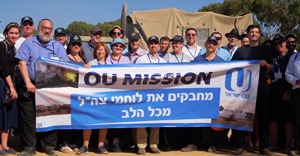It was a spontaneous decision to book a flight to Israel this summer the same day the flight left, but Batya Resnick couldn’t resist the opportunity to be part of a mission—the OU Solidarity mission—to strengthen the spirits of her Jewish brothers and sisters under fire.
As rocket fire began escalating, Batya, a 22-year-old graduate student at CUNY Baruch School of Public Affairs from Monsey, NY and administrative assistant at KOF-K Kosher Supervision, longed to be in Israel, to make some sort of difference. “We obsessively read articles and absorbed as much information as we possibly could, and yet were often left with feelings of helplessness and despair,” she felt.

While Batya was telling her boss that she wanted to take a trip to Israel, he suggested that she join the OU mission, but the trip was to leave on short notice. With the support of her family and friends, she found an open seat Thursday morning and left with the group Thursday night. “I was one of the youngest people on the program I immediately felt welcomed. Our group consisted of individuals of all ages, backgrounds and occupations—and most importantly, everyone was there for the same purpose,” Batya reflected.
The mission took the group to Sderot, where they spent Shabbat with soldiers and students of Hesder Yeshiva of Sderot and its local residents. Then, on to visiting injured soldiers at Soroka Hospital in Be’er Sheva. The third stop in a whirlwind of passionate chesed-driven activities led the group to a poor section of Dimona, a development town and third largest city in the Negev.
The Orthodox Union’s Israel division identified Dimona and other communities like it around the country in order to try to break the cycle of poverty and hopelessness, described RabbiBarry Kornblau, rabbi of the Young Israel of Hollis Hills-Windsor Park who blogged about the OU solidarity mission. The first focus was on the youth: to give them hope and good role models, and to keep them away from crime, the streets, and their depravities.

OU Israel staff and volunteers in Dimona cleaned out a formerly filthy bomb shelter in the middle of the housing development. Then, they stocked it with fun and food, and staffed it with idealistic young men and women, many of whom have moved into the neighborhood to integrate themselves into its daily life.
“Wholesome hope, old-fashioned caring, and abundant ahavat Yisrael (love for fellow Jews) attract and affect everyone in the entire neighborhood, young and old alike,” Rabbi Kornblau wrote. The effects were felt on the mission participants as well.
Connecting with the children in the bomb shelter, Batya noticed how unkempt the children seemed. “The clothing didn’t look clean, and I realized they must have such a limited amount of clothing to wear,” she reflected.
She decided then that, upon returning to Monsey, she would be proactive and help the children such as those she met in Dimona. “Once I went on the OU trip, I felt a responsibility to share my inspiration,” Batya emphasized. “I told so many people about my experiences, and they in-turn wished they had the opportunity be part of such a mission. I knew I had been privileged to meet people in Israel and become connected with their lives. I wanted to create a connection to the Israelis in need from those in my hometown, and strengthen the connection for those who already did.”
Additionally, Batya noted, “After the trip, I gained much more of an appreciation for Jews no matter what type they are. We met so many different individuals who came from far different backgrounds than mine, and everywhere we went it didn’t matter, everyone was just connected. Everyone felt like one nation. I wanted to hold on to that feeling of achdut and appreciation.”
Batya and her family decided to run a drive to send clothing to Israel and turned to Rabbi Avi Berman, executive director of OU Israel, for ideas to get the packages overseas. She was referred to Yad Leah, a New Jersey based organization which collects new and gently used clothing and then packs, ships and distributes that clothing in Israel.

A Sunday in late summer was chosen. Fliers were posted around town. Volunteers were coordinated to assist with set up, sorting, packing, and clean up. Moved by the efforts of Batya and her family, a moonwalk and fresh carnival treats were donated for young children, which served to raise the funds needed to ship the clothing to Israel. The afternoon took on opportunities for all ages and backgrounds to be involved—and they did.
Additionally, a table was designated for letters to be written to Israeli soldiers, which were mailed to Tel HaShomer Rehabilitation Center.

At the end of the day, 250 boxes filled with approximately 40 articles of clothing each, totaling more than 5,000 pieces of clothing, were packed and shipped to Israel. Among them were baby clothing, wedding gowns, warm winter coats, holiday clothing and everyday basics.
Reflecting on her experience on the OU mission and her successful clothing driving, “I went to Israel to show the people who were constantly under rocket fire that they are not alone,” said Batya. “I felt it was important to act upon my inspiration and share it with others by offering them an opportunity to help Israel as well. I felt it would be selfish if I came home and continued my daily routine without sharing the opportunity I had with others. With the help and support of so many people, we accomplished a tremendous amount and ultimately, strengthened the unity amongst ourselves, and our brothers and sisters in Israel.”
The words of this author reflect his/her own opinions and do not necessarily represent the official position of the Orthodox Union.
